- Home
- Ransom Riggs
The Desolations of Devil's Acre
The Desolations of Devil's Acre Read online
DUTTON BOOKS
An imprint of Penguin Random House LLC, New York
First published in the United States of America by Dutton Books,
an imprint of Penguin Random House LLC, 2021
Copyright © 2021 by Ransom Riggs
1, 2, 3: Ministry of Peculiar Affairs stamp © 2018 by Chad Michael Studio
4: Photo of man using computer © 2021 by Steve Ciarcia
5, 6: Bear and antelope heads © EVGENY LASHCHENOV / 123RF.com, ram heads © acceptphoto / 123RF.com
7: Poster art © Natalia Chernyshova / 123RF.com
Penguin supports copyright. Copyright fuels creativity, encourages diverse voices, promotes free speech, and creates a vibrant culture. Thank you for buying an authorized edition of this book and for complying with copyright laws by not reproducing, scanning, or distributing any part of it in any form without permission. You are supporting writers and allowing Penguin to continue to publish books for every reader.
Dutton is a registered trademark of Penguin Random House LLC.
Visit us online at penguinrandomhouse.com.
Library of Congress Cataloging-in-Publication Data is available.
Ebook ISBN 9780735231542
Edited by Julie Strauss-Gabel
This book is a work of fiction. Any references to historical events, real people, or real places are used fictitiously. Other names, characters, places, and events are products of the author’s imagination, and any resemblance to actual events or places or persons, living or dead, is entirely coincidental.
The publisher does not have any control over and does not assume any responsibility for author or third-party websites or their content.
Front cover photographs from The Thanatos Archive and the collection of Ransom Riggs
Cover design by Lindsey Andrews
pid_prh_5.6.1_c0_r0
For Jodi Reamer, slayer of beasts.
Sometimes an old photograph, an old friend, an old letter will remind you that you are not who you once were, for the person who dwelt among them, valued this, chose that, wrote thus, no longer exists. Without noticing it you have traversed a great distance; the strange has become familiar and the familiar if not strange at least awkward or uncomfortable.
—Rebecca Solnit
“The Blue of Distance”
A Field Guide to Getting Lost
CONTENTS
Cover
Title Page
Copyright
Dedication
Chapter One
Chapter Two
Chapter Three
Chapter Four
Chapter Five
Chapter Six
Chapter Seven
Chapter Eight
Chapter Nine
Chapter Ten
Chapter Eleven
Chapter Twelve
Chapter Thirteen
Chapter Fourteen
Chapter Fifteen
Chapter Sixteen
Chapter Seventeen
Chapter Eighteen
Chapter Nineteen
Chapter Twenty
Chapter Twenty-One
Chapter Twenty-Two
Chapter Twenty-Three
Chapter Twenty-Four
Chapter Twenty-Five
About the Photography
About the Author
For a long time there is only darkness and the sound of distant thunder and the hazy sensation of falling. Beyond that I have no self, no name. No memory. I am aware, dimly, that I used to have these things, but now they are gone and I am nearly nothing. A single photon of failing light circling a hungry void.
It won’t be long now.
I’ve lost my soul, I’m afraid, but I can’t remember how. All I can recall are slow, churning cracks of thunder, and within them the syllables of my name, whatever it used to be, drawn out until unrecognizable. That and the dark are all there is, for a long time, until another sound joins the thunder: wind. Then rain, too. There is wind, and thunder, and rain, and falling.
Something is coming into being, one sensation at a time. I am rising from the trench, escaping the void. My single photon becomes a flashing cluster.
I feel something rough against my face. I hear the creaking of ropes. The flap of something caught in the wind. Perhaps I am on a boat. Trapped in the lightless belly of some storm-tossed ship.
One eye blinks open. Forms thrash dimly above me. A row of swinging pendulums. Overwound clocks all out of sync, groaning, gears about to break.
I blink and the pendulums become bodies dropped from a gallows, kicking and twisting.
I find I can turn my head. Blurred shapes begin to resolve. Rough green fabric against my face. Above me, the tick-tocking bodies have become a row of storm-blown plants swinging from the rafters in creaky wicker baskets. Behind them, a wall of insect screens shudders and flaps.
I am lying on a porch. On the rough green floor of a porch.
I know this porch
I know this floor
Farther away, a rain-whipped lawn terminates at a dark wall of genuflecting palms.
I know that lawn
I know those palms
How long have I been here? How many years?
time is playing tricks again
I try to move my body, but can only rotate my head. My eyes flick to a card table and two folding chairs. I’m suddenly certain that, if I could persuade my body to rise, I would find a pair of reading glasses on the table. A half-finished game of Monopoly. A mug of steaming, still-hot coffee.
Someone has just been here. Words have just been spoken. They hang in the air still, returning to me in echoes.
“What kind of bird?”
A boy’s voice. My voice.
“A big hawk who smoked a pipe.” This one gravelly, accented. An old man’s voice.
“You must think I’m pretty dumb,” the boy replies.
“I would never think that about you.”
The boy again: “But why did the monsters want to hurt you?”
A scrape as the old man pushes back his chair and rises. He’s going to get something he wants to show me, he says. Some pictures.
how long ago was that
a minute
an hour
I have to get up or he’ll worry. He’ll think I’m playing a trick on him, and he doesn’t like tricks. Once, as a game, I hid from him in the woods, and when he couldn’t find me he got so angry he turned red and yelled bad words. Later, he said it was because he was scared, but he wouldn’t tell me what had scared him.
It is raining ferociously. This storm is an angry, living thing, and it’s already torn a gash in the screen, which thrashes like a flag in a gale.
something is wrong with me
I push up onto my elbow, but that is all I can manage. I notice a strange black mark on the floor. A burned line that tracks around me, tracing the outline of my body.
I try to push myself up fully to sitting. Dark orbs swim in my vision.
Then a giant crash. Everything goes blinding white.
so bright so close so loud
It sounded like an explosion but it wasn’t; it’s lightning, the strike just outside, so near that the flash and the thunderclap are simultaneous.
And now I am sitting upright, heart hammering. I hold a trembling hand before my eyes.
The hand looks weird. It’s too big. The fingers are too long. Black hairs sprout between the knuckles.
where is the boy am I not the boy
? I don’t like tricks
Tender red lines encircle the wrist.
handcuffs latched to a porch rail in a storm
I can see the tabletop and it’s empty.
There is no coffee cup. There are no glasses.
he isn’t coming back
But then, impossibly, he does. He is there, outside, at the edge of the woods. My grandfather. Walking in the tall grass, back bent against the wind, his yellow raincoat vivid against the dark palms and his hood pulled low to shield his eyes from the stinging rain.
what’s he doing out there why isn’t he coming in
He stops. Peers down at something in the too-tall grass.
I raise my hand. Call his name.
His back straightens, and only then do I realize: He’s all wrong. His frame too narrow. His walk too smooth for an old man with arthritic hips.
because it isn’t him
He jogs toward me, toward the house, to the torn and flapping screen.
the storm didn’t do that
what kind of monsters?
hunched and awful with rotting skin and black eyes and squirming
I am on my feet as he throws open the screen door and fills the threshold.
“Who are you?” he asks.
His voice is flat, tense. He pulls back the hood of his raincoat. He is middle-aged, his sharp chin accentuated by a trim red beard, eyes masked behind sunglasses.
It’s such a foreign experience to be in the presence of another person and standing on two feet that I hardly register the strangeness of his wearing sunglasses in a rainstorm.
Automatically, I answer.
“Yakob,” I say, and only after hearing it aloud does it sound wrong.
“I’m the realtor,” he says, but I know it’s a lie. “I came to board up the windows for the storm.”
“You’re a little late for that,” I say.
He enters slowly, as if approaching a skittish animal. The screen door hisses closed. He glances at the burn mark on the floor, then returns his cold gaze to me.
“You’re him,” he says, fingers grazing the card table as he clomps toward me in heavy black boots. “Jacob Portman.”
My name. My actual name. Something bubbles up from the trench, from the dark.
a horrible mouth formed in spiraling clouds, thundering my name
a girl, raven-haired and beautiful next to me screaming
“I believe you were acquainted with a friend of mine,” the man says. There is venom in his smile. “He went by many names, but you knew him as Dr. Golan.”
the horrible cloud-mouth
a woman writhing in the grass
The images surge into my mind with sudden blunt force. I shuffle backward until I hit a sliding glass door. The man is removing something from his pocket as he comes forward. A small black box with metal fangs.
“Turn around,” he commands.
I am suddenly aware that there is a great deal at risk, and that I need to defend myself. So I make myself docile, raise my hands as if in surrender, and when he comes close I bring my fists down on his face.
He shouts as his glasses fly off. The eyes behind them are shining blank eggs burrowed into his skull, and they have murder in them. There’s a loud snap as blue light arcs between the fangs in his black box.
He throws himself at me.
I feel a shock, a singe as he tasers me through my shirt, and I fly back against the glass door. Somehow it doesn’t shatter.
He is on top of me. I hear the whine of the taser recycling. I try to fling him off, but I am still recharging, too, and still weak. Pain rockets through my shoulder, my head.
And then he jerks and lets out a scream and goes limp, and I feel something warm running down my neck.
I am bleeding. (Am I bleeding?)
The man grasps at something and falls away from me. The something has a bronze hilt and protrudes six inches from his neck.
And now there is a strange new darkness behind him, a living shadow, and out of it flashes a hand that picks up my grandfather’s heavy ashtray and smashes the man in the head with it.
He groans and collapses. A girl steps out of the shadow.
The girl—the one from Before—long black hair tangled and wet with rain, long black coat smeared with earth, deep black eyes wide and fearful, searching my face and then sparking with recognition. And though all the pieces haven’t surfaced yet, and though my mind is reeling, I know that what’s happening is a miracle: that we are alive, and we are here, and not in the other place.
my God
such horrors I can hardly name them
The girl is on the floor with me now, kneeling, embracing me. My arms encircle her neck like a life preserver. Her body is so cold, and I can feel her trembling as we hold on to one another.
Without slackening she says my name. Repeats it again and again, and with each reprise the Now gains an ounce more weight, grows more solid.
“Jacob, Jacob. Can you remember me?”
The man on the floor groans. The aluminum bones of the porch screen groan, and the storm, the angry weather we seem to have brought with us from the other place, groans, too.
And I begin to remember.
“Noor,” I say. “Noor. You’re Noor.”
* * *
◆ ◆ ◆
In a flash, it all came to me. We had survived. Had escaped V’s collapsing loop. And now we were in Florida, on the green Astroturf of my grandfather’s porch, in the present.
Shock. I think I was still in shock.
We huddled together on the floor, gripping one another as the storm raged, until the tremors racking our bodies began to subside. The man in the yellow raincoat lay unmoving, save the diminishing rise and fall of his chest. Blood soaked the Astroturf around him in a sticky pool. The bronze handle of the weapon Noor had stabbed him with protruded from his neck.
“That was my grandfather’s letter opener,” I said. “And this was his house.”
“Your grandfather.” She pulled away, just far enough to look at me. “Who lived in Florida?”
I nodded. Thunder cracked, rattled the walls. Noor was looking around, shaking her head doubtfully. This can’t be real. I knew just how she felt.
“How?” she said.
I gestured to the burned outline on the floor. “I woke up there. No idea how long I was out for. Or what day it is, even.”
Noor rubbed her eyes. “My head’s all fuzzy. Everything’s out of order.”
“What’s the last thing you remember?”
She frowned, concentrating. “We went to my old apartment. And then we were driving . . .” She spoke slowly, as if piecing together a dream. “And we were in a loop . . . we found V’s loop! And we were running from a storm. No, a tornado.”
“Two tornadoes, wasn’t it?”
“And then we found her! Didn’t we? We found her!” Her hands grabbed mine and squeezed. “And then . . .”
Her hands went slack, her face blank. Her lips parted, but no words came. The horrors were returning, crashing over her.
Over me, too.
Murnau. Knife in hand, crouched above V in the grass. His arm raised in triumph as he ran toward the whirling maelstrom.
Heat flooded my chest, blocked my breathing for a moment. Noor buried her face between her knees and began to rock. “Oh my God,” she moaned. “Oh God, oh God, oh God.” I thought she might dissolve before my eyes, or burst into flame, or suck the light from the room.
But after a moment she jerked her head up. “Why aren’t we dead?”
A shudder rattled through me, involuntary.
Maybe we are.
For all I knew, we’d been crushed by V’s collapsing loop, just as Caul had intended. Noor herself seemed the only concrete evidence that what I was experiencing now
was more than just some purgatorial memory hole, the last-gasp fireworks of a dying brain.
No—I chased away the thought—we were here, and we were alive.
“She got us out somehow,” I said. “Got us here.”
“Through some kind of emergency exit. An eject button.” Noor was nodding and kneading her hands. “It’s the only explanation.”
To my grandfather’s house—the home of her mentor, her boss. He trained her, worked side by side with her. It made enough sense. What made no sense was that there wasn’t a loop here. So how had she done it?
“If she got us out,” Noor said, “maybe she got herself out, too.” There was hope in her voice, but it was manic, balanced on a knife’s edge. “She could be here. And she could still be . . .”
She couldn’t quite bring herself to say it. Alive.
“He took her heart,” I said quietly.
“You can live without a heart. For a little while, anyway . . .” She waved her hand. The hand was shaking.
We had only just regained our grip on reality, and already she was losing it again.
“Come on, come on, we have to look,” she was saying, already on her feet, words coming rapid-fire. “If there’s any chance at all, then we have to—”
“Wait a second, we don’t know what’s—”
In there, I meant to say. Waiting for us.
But she had already run into the darkened house.
* * *
◆ ◆ ◆
I planted a hand against the wall and wobbled up to standing. Noor was fraying, and I couldn’t let her out of my sight. She had used this wild hope that V might be alive to shore herself up, to shove away the despair that threatened to crush her. But I worried it would only be doubly crushing when she was inevitably disappointed. And I could not let Noor Pradesh break.
If Murnau’s vile task had succeeded, if what I had seen materialize in that tornado was real—Caul’s face in the whirling clouds, his voice splitting the air—if he was well and truly back, then the prophecy’s most terrifying predictions had started coming true. Which meant that all peculiardom was about to be buried. God only knew what Caul was capable of now that he had consumed one of the most powerful jars from the Library of Souls, then been crushed in its collapse, and resurrected.

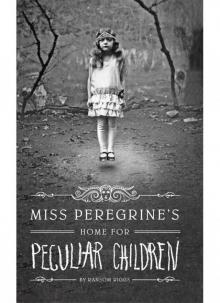 Miss Peregrine's Home for Peculiar Children
Miss Peregrine's Home for Peculiar Children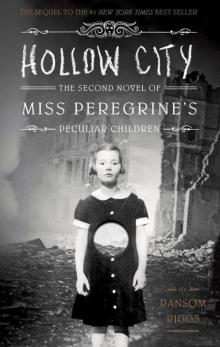 Hollow City
Hollow City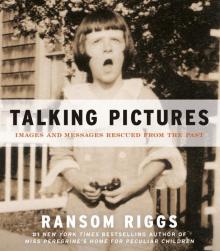 Talking Pictures: Images and Messages Rescued From the Past
Talking Pictures: Images and Messages Rescued From the Past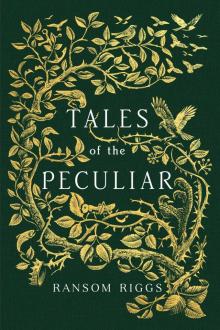 Tales of the Peculiar
Tales of the Peculiar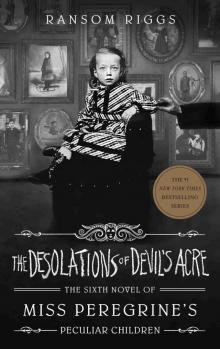 The Desolations of Devil's Acre
The Desolations of Devil's Acre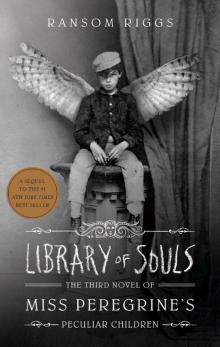 Library of Souls
Library of Souls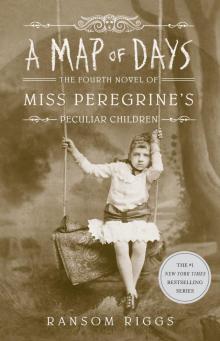 A Map of Days
A Map of Days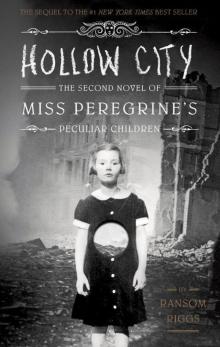 Hollow City: The Second Novel of Miss Peregrine's Peculiar Children
Hollow City: The Second Novel of Miss Peregrine's Peculiar Children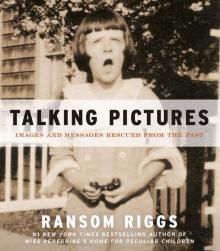 Talking Pictures
Talking Pictures